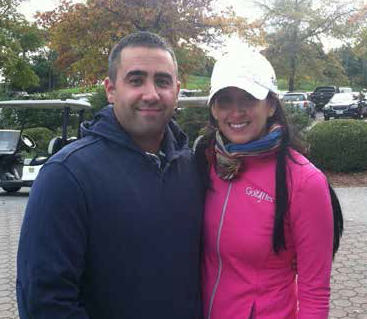I’ve always had trust with the whole facility. The doctors were familiar with Lynch Syndrome, the entire team made me feel comfortable and I could not have been happier to have them help me through this phase of my life.

Christina Thompson survived cancer twice thanks to The Cancer Center at Cooperman Barnabas Medical Center and an aggressive screening protocol. Now, her life’s work is to advocate for early screening and knowing your family history—so her mother’s death wasn’t in vain.
In 1993, when Christina Thompson was 23 years old, her mother passed away at age 46 due to colon cancer. Her mother’s death changed her life for obvious reasons, but also incentivized her to begin getting regular colorectal screenings every three years starting at age 24 due to her family history. “My maternal grandmother had stomach cancer and uterine cancer, but nobody made the connections at the time,” Christina says. So, she took it upon herself to be proactive about her health—and to find a medical team that would help her and not dismiss her symptoms to stress or IBS like previous doctors had done.
But even after having a colonoscopy at Saint Barnabas Medical Center—now called Cooperman Barnabas Medical Center (CBMC)—every 3 to 4 years with no known polyps detected, Christina was diagnosed with stage 3 colon cancer at the age of 41 in 2011. She had no outright symptoms. “It was alarming because I was doing everything I thought I was supposed to be doing to stay on top of it,” she recalls.
Given her family history, instead of performing a more conservative resection of the tumor, Mark Gilder, M.D., a colon and rectal surgeon at CBMC, performed a subtotal colectomy, which removes three quarters of the colon and reconnects the small bowel to the upper portion of the rectum. “This was in her best interest because of the concern for Lynch Syndrome (based on her family history). By removing as much of the high-risk target cancer site (the colon), we could more easily evaluate her for the future. “But we’re still doing surveillance [on her], because she has a remnant of the rectum that could develop cancer.”
After the successful surgery, Christina underwent six months of chemotherapy at The Cancer Center at CBMC, a partner of Rutgers Cancer Institute of New Jersey, the state’s only National Cancer Institute-designated Comprehensive Cancer Center, and was declared cancer-free. But Dr. Gilder—and his patient—had an inkling that there was something deeper going on. In 2013, genetic testing that wasn’t widely available at the time of her diagnosis revealed Christina had Lynch Syndrome, an inherited cancer syndrome associated with a genetic predisposition to different types of cancer, often before the age of 50.
Christina was then put on a regimented screening protocol at The Cancer Center at CBMC of yearly MRIs, colonoscopy and endoscopy, and twice-yearly mammograms, pap smears and blood work. Her doctors also suggested a hysterectomy due to her increased risk of endometrial and uterine cancers. “I wasn’t thinking about having another aggressive surgery,” she admits. “I put it off, I was working, I launched my own women’s golf pro shop called Golf4Her. Golf was a big distraction for me during that time.”
But in 2015, she was experiencing some gynecologic issues, and was diagnosed with stage 1 endometrial cancer at age 45. She once again received her care at CBMC, where she felt most comfortable and confident in receiving treatment, and underwent a radical hysterectomy where doctors removed her uterus, along with her cervix and parts of the vagina. “I was sensitive to every little thing my body was feeling,” she says. “Listen to your body—your body will tell you what’s wrong with it.”
A Different Fight
 Christina, now 52 and living in Rockaway with her husband, Mark, has been cancer-free for eight years. “I live a really normal life, I don’t have an ostomy bag, and anyone who meets me is surprised that I’ve gone through what I’ve gone through,” she says. Still, though her outlook and mood are generally positive, Christina admits she’s still in fight-or-flight mode. “There’s always a chance of another cancer diagnosis of the stomach, bladder or small intestine,” she says. “I’m never really in remission, and these things weigh on me every single day. It’s exhausting.”
Christina, now 52 and living in Rockaway with her husband, Mark, has been cancer-free for eight years. “I live a really normal life, I don’t have an ostomy bag, and anyone who meets me is surprised that I’ve gone through what I’ve gone through,” she says. Still, though her outlook and mood are generally positive, Christina admits she’s still in fight-or-flight mode. “There’s always a chance of another cancer diagnosis of the stomach, bladder or small intestine,” she says. “I’m never really in remission, and these things weigh on me every single day. It’s exhausting.”
Nonetheless, Christina is thankful she has a supportive husband, a devoted medical team, the ability to continue playing golf and that she runs a business she loves (in fact, in 2021 she expanded the Denville-based Golf4Her from an e-commerce site into a foundation to raise money for women’s health screenings). She’s also become an advocate for cancer awareness and for Lynch Syndrome.
“With my own diagnoses and what I went through with my mom, I can’t help but talk about it,” she notes. “Getting scanned is still such an awkward conversation, and we’re talking about our butt! But it’s a functioning part of our body that we need to address. I have no shame.” Recently, her younger brother, Carmine, opted out of early screening, but was also diagnosed with Lynch Syndrome, underwent the same surgery with Dr. Gilder and has been put on the same screening protocol at CBMC.
“We now have the ability for everyone in a family with a history of cancer to be tested for a genetic disorder like Lynch Syndrome at a much earlier age,” Dr. Gilder notes. “We can figure out who is predisposed to certain types of cancers, and then perform a prophylactic surgery on those who are high-risk, which prevents cancer from developing as opposed to waiting until you’re diagnosed. We can’t change our genetics, but we can act on it much earlier for better outcomes.”
 If people get just one takeaway from Christina’s story, she hopes it’s about the importance of screening, especially for those with a family history of cancer. “I was ‘looking’ for cancer and was prepared for it, but it still snuck up on me,” she says. “It’s so important to talk to about your family history, to get screened as early as possible and to be your own advocate if you don’t feel quite right. Take care of yourself and fight for yourself.” Dr. Gilder also stresses that patients should bring up their family history with their health care providers so you can be “referred to the right specialists and protect future generations.”
If people get just one takeaway from Christina’s story, she hopes it’s about the importance of screening, especially for those with a family history of cancer. “I was ‘looking’ for cancer and was prepared for it, but it still snuck up on me,” she says. “It’s so important to talk to about your family history, to get screened as early as possible and to be your own advocate if you don’t feel quite right. Take care of yourself and fight for yourself.” Dr. Gilder also stresses that patients should bring up their family history with their health care providers so you can be “referred to the right specialists and protect future generations.”
Christina knows that her fight and her advocacy would’ve made her mother proud. “I want to make sure that my mother didn’t die in vain and that her story can be told,” she says, getting emotional.
“Because of her, her daughter and her son are still alive.” As a West Orange native, Christina says Cooperman Barnabas Medical Center was a “no-brainer” when it came to choosing where to seek medical care. Dr. Gilder was referred to her by multiple other surgeons, she says. “I’ve always has trust with the whole facility. The doctors were familiar with Lynch Syndrome, and entire team made me feel comfortable and I could not have been happier to have them help me through this phase of my life.”
Learn more about The Cancer Center at Cooperman Barnabas Medical Center and schedule a colonoscopy.